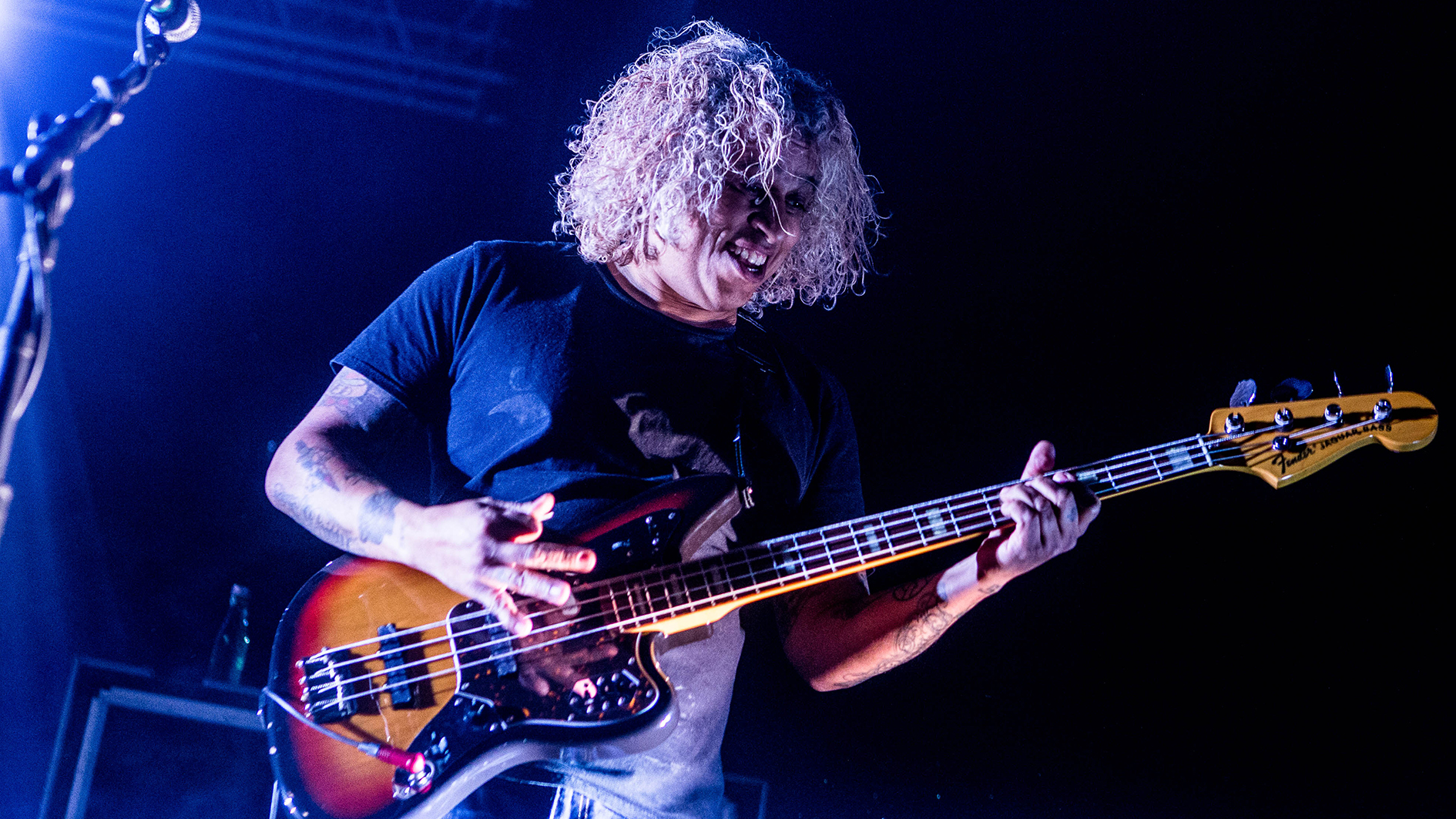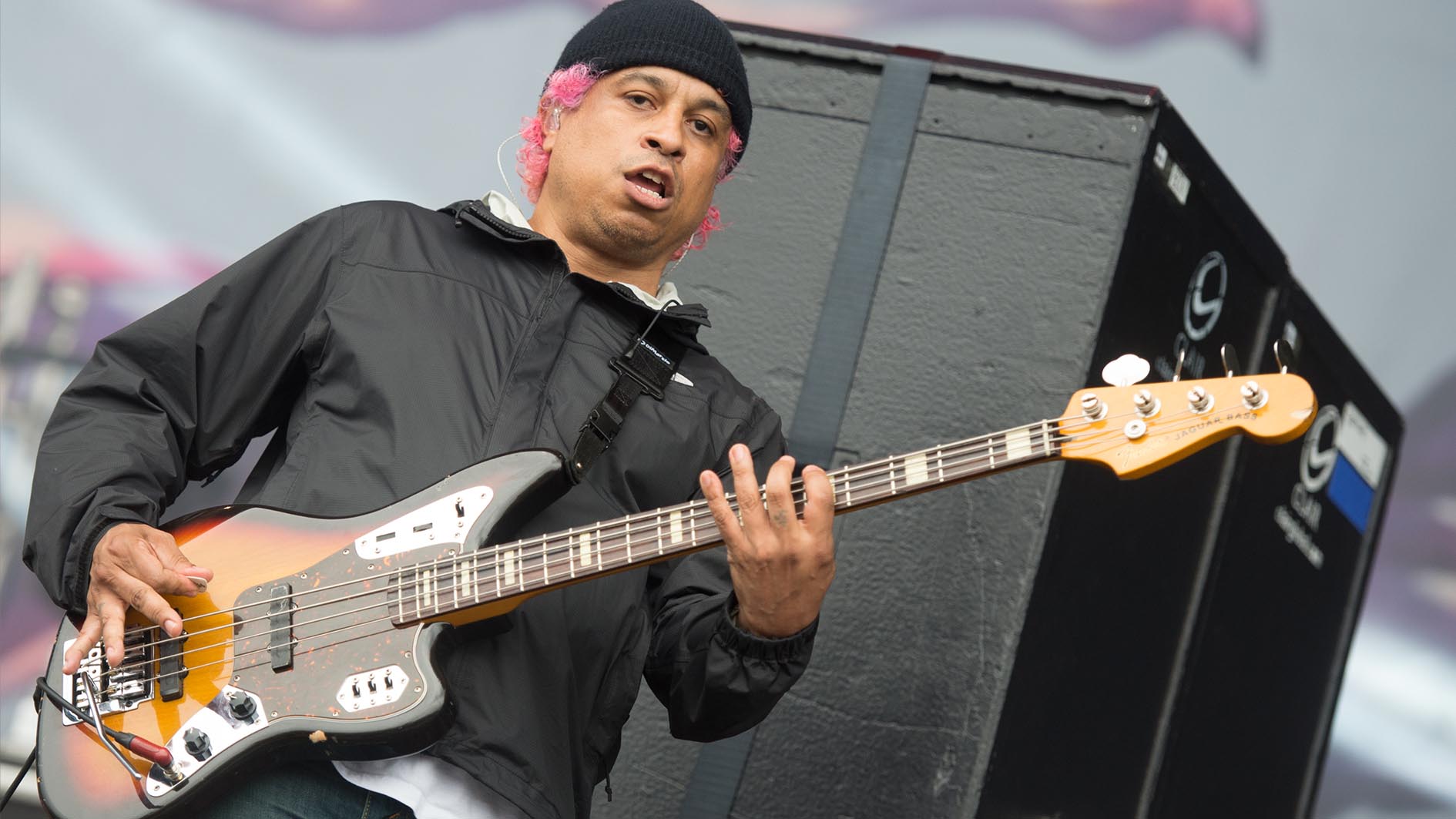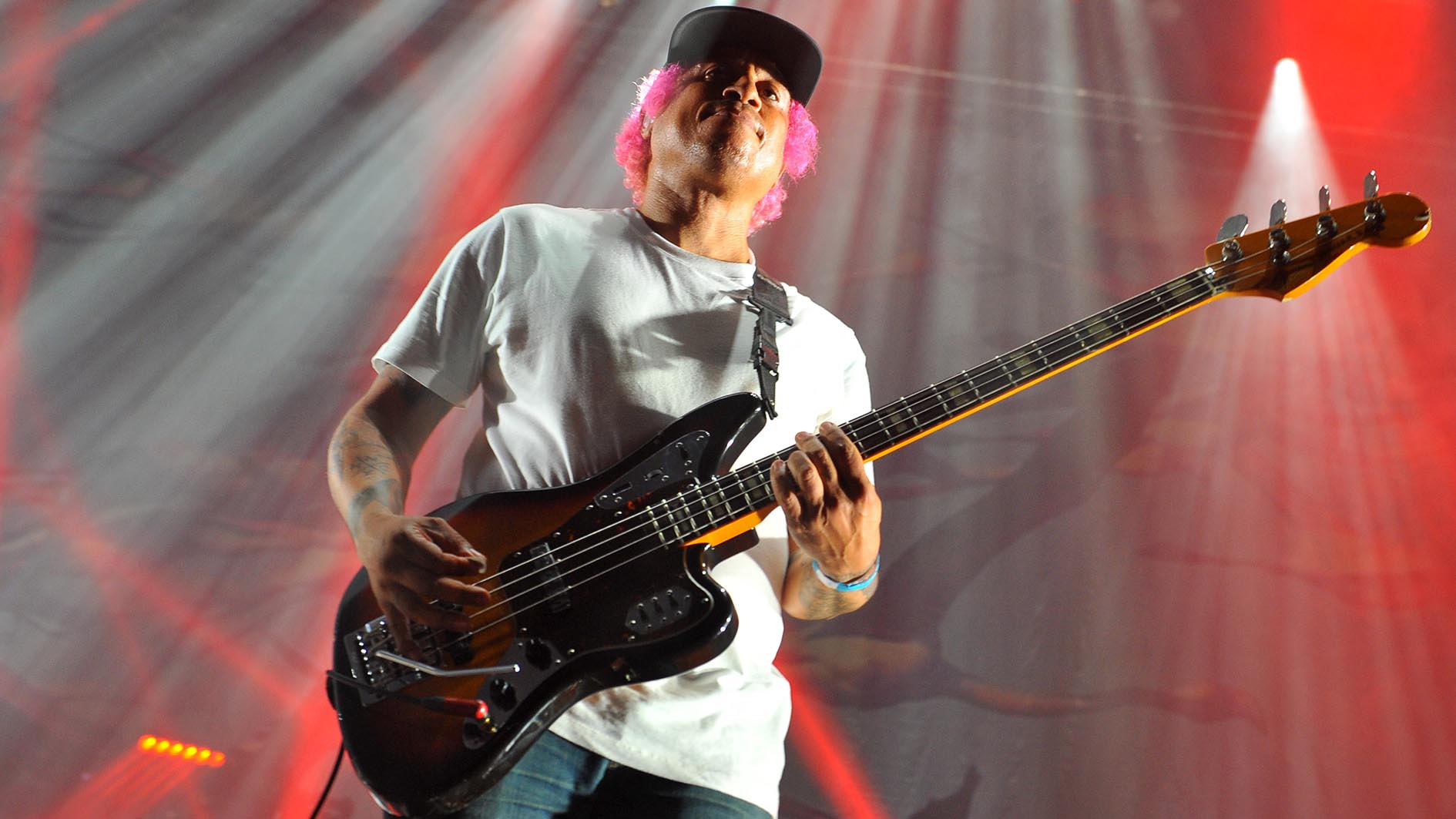Sergio Vega on his exit from Deftones and new "revolving-door" project
The Quicksand bassist reveals why his time with the alt-metal titans had run its course, and details his plans to work with guest musicians including Every Time I Die's Keith Buckley

All the latest guitar news, interviews, lessons, reviews, deals and more, direct to your inbox!
You are now subscribed
Your newsletter sign-up was successful
It would be fair to say the news that Sergio Vega had parted ways with Deftones – announced back in March via the bassist’s Instagram – certainly caught fans off-guard.
The Bronx-born musician ended up joining the Sacramento alt-metal heroes in 2009 after a car crash left his predecessor Chi Cheng in a comatose state, ultimately leading to Cheng’s death in 2013.
After four successful studio albums and all the heavy-duty touring that came with them, a visibly emotional Vega thanked his ex-bandmates for the opportunity of a lifetime, while also expressing his sadness at their reluctance to update his contract to one that, in his view, reflected an official place within the band, as had allegedly been discussed when he first joined.
The only offer on the table, however, was the same one – which was eventually withdrawn, leading to Vega’s behind-the-scenes dismissal in early 2021. The speculation over a Spotify band photo without him roughly a year later, Vega explained in the video, is what forced him to tackle the big questions himself head-on and explain what happened to their masses of fans across the globe.
“To be honest, it wasn’t easy but it was necessary,” he tells Guitar World, a few months later from his home studio in New York City, where he’s been busy working on projects old and new.
“I wanted people who had invested their time and love into the band to understand what happened – it’s nothing too dramatic or super-crazy. In the absence of any official statement or explanation, people were starting to speculate about what was going on.
“I also didn’t want anyone to think Quicksand being active was impacting on Deftones negatively. Ultimately, my time with them was just something that had run its course. I had to give a little more detail, just to fill some of that void and stop some of the speculation over why things had turned out this way. It’s not easy to come out and say things like that, so yeah, it was very emotional…”
All the latest guitar news, interviews, lessons, reviews, deals and more, direct to your inbox!
A post shared by Sergio Vega 🌌 (@smurffedout)
A photo posted by on
Looking back on your time in the band, what were your favorite tracks to play live from the early records, and did you ever consider playing fingerstyle like Chi did?
“I think Lifter was always at the top for me. I think that’s my all-time favorite Deftones song. It always sounds really awesome to my ears. As for playing fingerstyle, not really. What I latched onto more were the similarities in our styles – the way our parts are constructed is of a similar philosophy.
“Our kind of basslines don’t have to be busy; they have to be substantial and say something important to the overall structure of the song. So when I joined the band, I was mainly embracing the similarities than worrying about playing fingerstyle like he did. That would have put me – and the songs – at a disadvantage, having been a pick player for decades. Switching to fingerstyle suddenly and learning to play it all right wouldn’t have had the same impact.”
And, of the tracks you wrote or recorded with the band, which are you most proud of?
I never like to feel like the best is behind me. I like to continue improving my concepts and approaches
“As an artist, you’re always most fond of the newest stuff you’ve done… and you should be! So for me it’s the latest crop of [Deftones] material that I’m most proud of. I never like to feel like the best is behind me. I like to continue improving my concepts and approaches.
“In terms of writing, the majority of those songs came together collaboratively. There were some that started as a seed, like the track Genesis – which came from a home demo, something I wrote when I was living in Harlem... To send that out and see it become elevated by the whole band was really exciting.
“So there were songs like that, and others Stef [Carpenter, guitars] or Chino [Moreno, vocals/guitars] came up with, or maybe other stuff reacting to Frank [Delgado, keyboards/turntables].
“It was always happening in a lot of ways. I don’t feel there was much music which my hands weren’t in, and the same goes for everyone else. It might have been Stef’s riff, or a demo Chino or myself had recorded at home, or just something that happened organically… but it always went through everyone.”
It was a lot more than session work for you, in any case...
“They brought me in as a writer and like I said in my statement, I just wanted to bring my best to the situation. It being so collaborative made the whole experience even cooler. It was a nice feeling to develop within the band and see new ideas fit really well into the older catalog.
“It’s helped fuel my desire to fulfill these new projects and collaborate more. And it’s the same in Quicksand, we will all come up with ideas and elevate them together. That vibe is the whole reason I signed up for music in the first place.”
Congratulations on the 2022 Grammy nominations, by the way. Did you see your ex-bandmates on the night?
“We ran into each other but didn’t really have an opportunity to talk. That’s not the place. I’m sure I will see them again – my hope is that we all have very long careers, so yeah, that would be inevitable. I want to continue making music for the rest of my life and there’s a high probability of us all crossing paths.
“I want to carry on working with super-talented people. Looking back on my time in the band, appreciating moments together has made me realize I put my best foot forward. I learned so much and got to grow. That was very cool.”
You’ve announced a new project with Chris Enriquez from Spotlights which features a revolving door of guest musicians. Tell us more...
That idea of creating energy for just one track without having to think about time management later down the line felt exciting
“That revolving door thing explains it well. This project is something to allow me and Chris to write and create with all kinds of people. One of my favorite producers, Nick Raskulinecz, once told me about capturing lightning in a bottle and using time as an opportunity to push different aspects of yourself in the studio.
“You can do it to a high level without the burden of needing to play live or take it on tour, taking a bunch of like-minded people to almost have a jam session conversationally over coffee, talking music and energy.
“I’ll take that to my home studio and start banging out a track based on that conversation. Then we’ll get together a week later and record it. It’s not something I’ve seen done often but I guess I was inspired by an Argentinian producer named Bizarrap, who puts out various singles with different people. That idea of creating energy for just one track without having to think about time management later down the line felt exciting.”

And naturally, it’s going to be a different kind of creative process every time with different personnel...
“It’s fun because I’ve found it encourages quick decision-making. And that actually feeds into other things, like jamming with Quicksand. Now I won’t overthink, I’ll just go with what feels best early on. And I didn’t really want to start something new that takes time away from Quicksand because people are enjoying having us back. I don’t want to infringe on that.”
You recently announced that ex-Every Time I Die frontman Keith Buckley will be one of those guest collaborators – which is interesting as many would say he’s been through a similar situation recently himself...
I’d been label mates with Every Time I Die on Epitaph and had listened to them casually, but then I had a great time doing a deep-dive and appreciating their musicality and song structures under Keith’s vocals and vibe
“Yeah, we didn’t know each other at all! We still haven’t met in real life or been in a room together. We got together on FaceTime and there was a hype – a moment that we all really enjoyed talking about making music.
“I’d been label mates with Every Time I Die on Epitaph and had listened to them casually, but then I had a great time doing a deep-dive and appreciating their musicality and song structures under Keith’s vocals and vibe.
“There’s a lot of fire in there and that’s all I was looking for, it’s what I try to bring in terms of passion and energy. I knew it would be great working together, so I sent him a track and he started talking about getting into the studio, keeping it all very quiet and contained.”
So he could end up doing more than one track, potentially?
“We’re kinda thinking about doing this as just a song at this stage – not to say we’re not open to it or excited about what could happen. But psychologically it’s been working for us to keep this in a box as one track. As the person writing and creating, a lot of it comes down to the psychological aspect of the collaboration.
“I try to protect that environment so new things keep coming out, it’s like my bubble to keep this whole thing without pressure, which tends to bring a second round of thought and slow things down.”

We’d love to know what kind of gear you’ve been using to record…
“I’ve been using my Line 6 Helix [amp modeler] a lot. Sadly, I haven’t been doing much with analog pedals mainly because of space constriction… I live in New York City! But I love pedals to death. If I had the space, I’d be using them more. Nowadays, I will come up with a concept and try to build it within a digital realm.
“I’ve used Fractal systems in the past, which are amazing, but there’s something about the Line 6 gear that’s incredible. I have the HX Stomp XL at home to record with, [and] an HX Floor with all my patches in the Quicksand space – I love all that stuff.”
Are you still playing the Fender Bass VI you started using around Deftones' eighth album, Gore?
I’m not as interested in going below – I’m more into playing around the higher registers
“It’s almost primarily that [bass] guitar. I tend to use Jaguars or the Bass VI, and the latest Quicksand record was entirely the latter. It can do things that a four-string can’t do. I’m not as interested in going below – I’m more into playing around the higher registers.
“I got my first one while recording [Deftones seventh album] Koi No Yokan, thinking it would help cement certain ideas. I wanted to try a whammy bar for certain touches and extra bits of ear candy… That’s when I realized it’s an instrument unto itself. Over the next few years I started developing the right tones for it, to see how it could work and add more depth without making too much of a difference.
“It’s been a fun exploration of what approaches work and which ones don’t, even just feeding back off what other people had to say about it. By the time I got to the latest Quicksand record, I was like, ‘Wow, I can do the whole catalog on the Bass VI!’ which means reducing the amount of instruments I need to bring out with me.”
Your sound tends to live on the more aggressive side. There’s a 2017 Fender video in which you talk about dialing in a crispy high-end for extra articulation – it’s funny how things like that can almost sound like an extra layer of rhythm guitar...
“Exactly! It can make you sound infinitely taller and wider. I try to think about the sonic landscape around me – I don’t have synesthesia, but I try to think about the layout in terms of width and height, just to figure out where the bass could sit well. And that tends to be really low, [but with] some higher-end frequencies for the extra aggression.
“You can then scoop out the frequencies where the guitars live. I love the idea of a bass eating a little bit above as well as under the guitars. For some reason, that brings a certain heaviness, plus levels of detail that seem to get lost otherwise.”
And, of course, using a pick helps to get a heavier kind of attack...
Funnily enough, I’ve never slapped a bass! I know it sounds blasphemous but I’ve never been there. I guess it’s mainly because I rarely play without a pick!
“That piece of plastic has always been integral to my attack and approach. And it’s easier to make a pick sound like fingers than the other way round. I’ve always appreciated the precision and extra gnarl or aggression you get from a pick.
“If you find yourself in situations where you need that lighter finger touch, you can do that with dynamics and even EQ. Funnily enough, I’ve never slapped a bass! I know it sounds blasphemous but I’ve never been there. I guess it’s mainly because I rarely play without a pick!”
In a Bass magazine cover story from 2017, you revealed that your favorite player on earth was Rob Miller from Amebix and you even had the band logo tattooed on your chest. Tell us more about how they have influenced you...
“To me, Amebix represent the gnarly side of punk. I came into rock through hair metal on television and from there I got into punk and goth. When I found Amebix, I was already playing bass. I had this huge sense of connection to that sound. It felt so obvious to me that this was what I wanted to do.
“They were like the crusty version of Pink Floyd with synths and grandiose builds, and all this randomness that made it all so unique. They’re still my main influence! Amebix check a lot of boxes for me – it’s a bass-driven thing, very distorted and experimental.
“They did their own thing that will live on forever, whether you like them or you don’t. Their sound is eternal, it doesn’t feel like it’s from the '80s or '90s or any given era. I place a high value on that… it’s something I strive for in my own ideas.”
Amit has been writing for titles like Total Guitar, MusicRadar and Guitar World for over a decade and counts Richie Kotzen, Guthrie Govan and Jeff Beck among his primary influences as a guitar player. He's worked for magazines like Kerrang!, Metal Hammer, Classic Rock, Prog, Record Collector, Planet Rock, Rhythm and Bass Player, as well as newspapers like Metro and The Independent, interviewing everyone from Ozzy Osbourne and Lemmy to Slash and Jimmy Page, and once even traded solos with a member of Slayer on a track released internationally. As a session guitarist, he's played alongside members of Judas Priest and Uriah Heep in London ensemble Metalworks, as well as handled lead guitars for legends like Glen Matlock (Sex Pistols, The Faces) and Stu Hamm (Steve Vai, Joe Satriani, G3).

